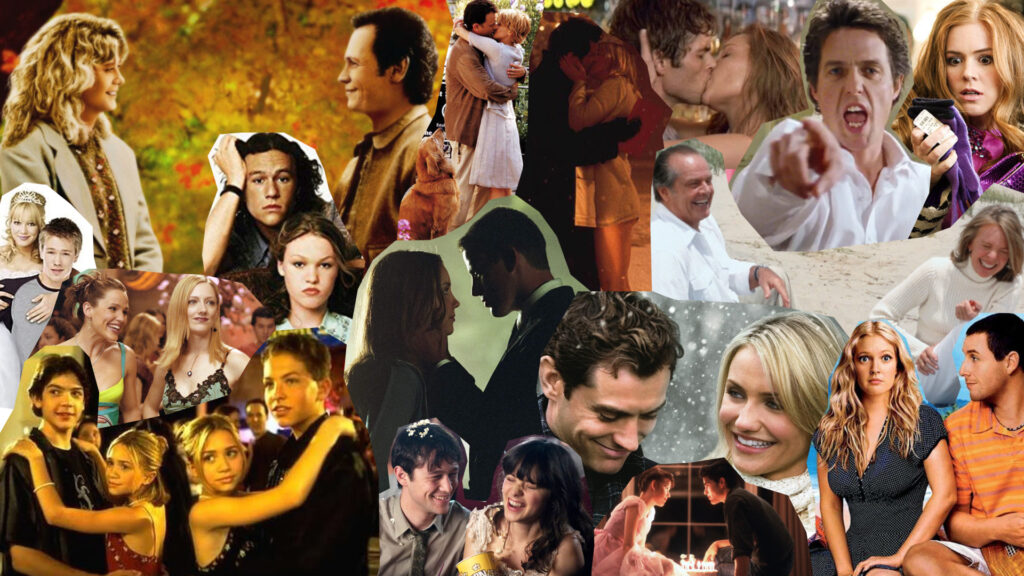
Photo contributed by Muse
There is nothing better than curling up with a cozy blanket and your favorite movie, but that experience gets ten times better when said movie is a light-hearted, sappy, and often predictable rom-com. The meet-cutes, the soundtracks, and the oh-so-overused plot lines and montages define this genre that is home to so many iconic films. Despite seeing their peak a few decades ago, rom-coms have been a source of entertainment for many decades, dating back to Shakespeare and the Greeks.
Rom-coms entered their golden ages in the 1990s and early 2000s with hit films like Notting Hill and 27 Dresses. According to Statista, the genre peaked in 1999, grossing 835.83 million dollars in the United States alone.
Rom-coms offer comfort to their viewers, unlike any other genres. People are drawn to these movies for their balance of emotion and romance with lighthearted laughter and realistic characters. The stories commonly follow the same plot line: two love interests meet, then part ways due to an obstacle in their relationship, but ultimately realize their love for one another is stronger and reunite to end the movie with a trusted happy ending. Although the repetition of the basic plot may seem too predictable for non-rom-com fans, that makes the genre so inviting: the safe repetition allows you to relax, knowing you will never face a jump scare or disappointing ending.
Despite their height in the early 2000s, rom-coms have seriously fallen off. They brought profit to Hollywood but could never reach the status of Marvel-like movies. With the rise of big-budget superhero films and dystopian series like Divergent and The Maze Runner, rom-coms didn’t draw nearly the same masses that these franchises did, and in turn, they weren’t as likely to receive awards.
It wasn’t just the lack of revenue that started the downward spiral of such a beloved genre, but also the sexism from the industry that caused the fade-out of rom-coms. The term “chick-flick” was used to describe feminine movies such as Clueless and 10 Things I Hate About You in a negative light. Although “chick-flick” has now been turned into an adjective for movies that appeal to mainly female audiences, it was used in the 2000s as a derogatory term to bash the success and status of rom-coms. Sandra Bullock, rom-com superstar from The Proposal, While You Were Sleeping, Two Weeks Notice, and dozens more, told The New York Times, “I think when everything swung toward the very masculine action-adventure, women got relegated to the arm piece, or the damsel in distress.” When the industry’s focus shifted, the rom-com died, and it hasn’t found the right time for a proper revival.
However, in recent years, rom-coms have been making a comeback in a new way. Anyone But You hit the box office late last year, bringing in a surprising amount of press. The movie was an adaptation of Shakespeare’s Much Ado About Nothing starring heartthrobs Glen Powell and Sydney Sweeney, along with long-time rom-com star Dermot Mulroney. Powell and Sweeney’s characters, Ben and Bea, reunite months after the one night they spent together and are forced to get along for Bea’s sister’s wedding. The classic enemies-to-lovers trope has every ingredient for a perfect rom-com: a charming meet-cute, stacked cast, a familiar plot line, and a killer soundtrack. After being released on December 22, 2023, Anyone But You has since grossed over $207 million internationally. More than 2.8 billion people flocked to the theaters and left dancing to “Unwritten” by Natasha Bedingfield, the movie’s catchy theme song.
The success that this movie has seen is creating the perfect opportunity for rom-coms to receive the second life they deserve. Rom-com fans can hope that the popularity of Anyone But You will catch on in the industry, and we will get more films like Say Anything and Pretty Woman.
